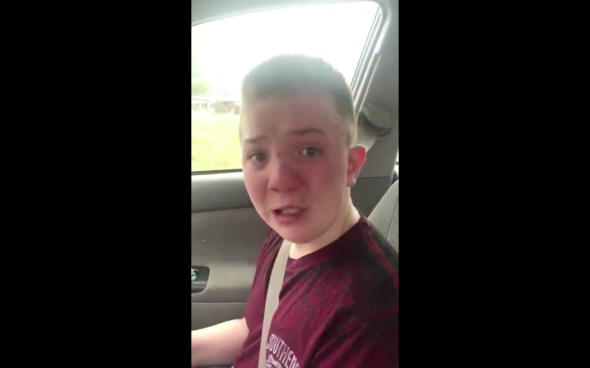On the internet, even compassion is a blood sport.
You’ve probably already seen the video that Keaton Jones’ mother uploaded to Facebook last Friday. In it, the Tennessee boy speaks directly to the camera she’s wielding, explaining that a group of other boys had called him ugly and poured milk on him. “What’s the point of it? Why do you find joy in taking innocent people and finding a way to be mean them?” Jones asks, seemingly choking back tears. “People that are different don’t need to be criticized about it.”
Almost as one, the denizens of the social web spoke up on Jones’ behalf, outrage mingling with empathy. “I hope those who bullied him get what’s coming to them,” wrote the author of a viral tweet about the video. Many found other ways to dramatize their sympathy: The actor Chris Evans invited Jones to join him at a movie premiere, and other celebrities made similar overtures. A GoFundMe user named Joseph Lam created a campaign to raise money for the Jones family. Apart from a quotation attributed to Ronald Reagan—“We cant [sic] help everyone but everyone can help someone”—Lam offered no explanation as to why the family might need money. Nevertheless, the effort raised almost $57,000 in just two days.
Fast as support for Jones came, the backlash quickly outpaced it. Some called attention to social media posts in which Jones and his family members appeared to pose with confederate flags. While many of those posts would eventually prove fake, Jones’ mother Kimberly confirmed that a few of the images were real. Meanwhile, other scammers and impersonators attempted to capitalize on the Jones’ sudden fame, soliciting PayPal donations and creating alternate GoFundMe pages. As the controversy grew, Lam paused his own campaign, writing in an update, “ Im [sic] in touch with [GoFundMe] on how to proceed at this point.”
In retrospect, it’s tempting to be cynical about the video itself: Why, one might ask, is this sobbing child’s caregiver filming his sorrow instead of comforting him? Was the family intentionally pursuing viral fame, perhaps? Keaton Jones, for what it’s worth, has claimed that the video was his own idea. Perhaps more significantly, his mother’s confederate flag photo suggests that she lacked the social media savvy to anticipate how others might respond to anything she posted. The video seems real enough, then, even if the early enthusiasm was overzealous.
There is, however, something striking about Kimberly Jones’ response to the controversy. By way of explanation for those troubling photos, she offered CBS News the wan defense that her confederate flag images were “meant to be ironic and funny,” a claim that demonstrates a flexible understanding of both irony and humor. Tellingly, she went on to propose that she had been victimized in the past: “I’ve said I’ve spent most of my life being bullied and judged because I wasn’t racist,” she told CBS’s Mark Strassmann.
Here, “bullied” becomes a word to summon by, an abstract signifier of one’s own goodness, all but detached from both the experience of individual pain and the fact of systematic oppression. Kimberly Jones effectively parasitizes her son’s testimony, attempting to tap our residual reserves of goodwill. There are echoes here of Melania Trump’s tone deaf condemnation of bullying, a campaign that suggests she has never met her husband. Like the first lady, mère Jones seems to believe that merely alluding to bullying can shut down an unpleasant conversation. This is their syllogism: Bullying is bad. I condemn bullying. Therefore I must be good.
They are not entirely wrong to come to this conclusion, however dubious the underlying logic. Those of us who live on the internet agree about few things, but none of us (OK, almost none of us) are likely to argue in favor of bullying, even when we perpetrate it ourselves. There’s a certain relief to this premise, promising as it does that we can, at least, all get angry about the same thing once in a while. Surely this feeling of collectivity drove the Jones video’s initial popularity. In a fragmented moment, what could be more pleasant than circling the wagons around a beleaguered child?
If the story has taken a grim turn, however, a deeper current of virtual congruence may be at fault: our collective expectation that everything we love online will turn bad. In some circles, the phenomenon is known as Milkshake Duck-ing, after a joke by weird Twitter personality Pixelatedboat. Our faves, we have learned to believe, will inevitably turn problematic, souring faster than milk left out on the counter. Skepticism is not the inverse of enthusiasm so much as its louder echo. It’s not that we can’t let good things be good, just that we can’t stop ourselves from identifying how they are also bad. At core, we do it for the same reason we hate bullies: If we’re going to ensure that we’re in the right, it’s safest to assume that everything is wrong.
